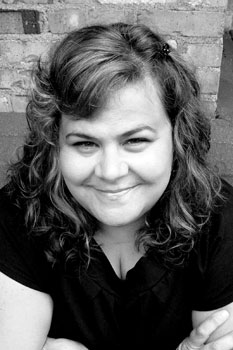Discovering Gold
Poet Catie Rosemurgy’s work-in-progress mixes fact with fantasy to trace the fictional history of a town called Gold River.

Associate Professor of English Catie Rosemurgy was one of only two poets to win a PEW Fellowship this year.

“You don’t get to pick what obsesses you,” said Catie Rosemurgy, the soft, late summer sunbeams streaming through the window of her Bliss Hall office.
Recently the recipient of a $60,000 Pew Fellowship, Rosemurgy’s current obsession is her latest project, tentatively titled The Small Museum of Our Burning, an interwoven collection of poetry and prose wherein she pieces together the history of Gold River, a fictional town that fans will recall from her second book, The Stranger Manual.
“All my projects tend to grow out of each other,” the associate English professor said. Though, as she began her third project, it was a far cry from the town of Gold River.
“I was attending a lot of dance and working with a choreographer and I did develop some pieces, a few of which ended up in my second book, and I thought that would be the natural extension that led into the third book,” she recalls. “When writing, the body almost disappears and you become [part of it]… dance is very much like poetry, except that it is completely embodied.”
While the similarities between dance and poetry compelled her, she can’t pinpoint the moment when that project decelerated, outpaced by her interest in researching the histories of the small lumber and shipping towns of the great American Upper Midwest.
“My interest was in this town and the history and backstory that were unknown, all the things that have happened there that you would never even know. In Philadelphia, where I live now, the history is marked with signs and there are tours, and of course there are so many things that have happened that we have no record of, but the tension between the history that is enacted by guys in Ben Franklin suits versus the stuff that is invisible and, maybe, completely lost—that kind of tension began to really obsess me.”
Loosely inspired by her formative years in Michigan and historical accounts of disasters in that part of the country, Gold River is a town haunted by fire, shipwreck, and drowning.
“There was a huge fire in the same year as the Chicago fire in 1871 that was the most destructive forest fire in the history of the United States of America, largest loss of life, huge loss of property and natural resources. Same day as the Chicago fire, which was much smaller. We know about the Chicago fire because it’s part of history.”
The unspoken questions that seem to fuel her obsession revolve around contemporary approaches to history, an interest she didn’t even know she had.
“A lot of research goes along with this, and that’s one of my favorite parts of it.”
She spends time in small museums such as the Peshtigo Fire Museum (in Peshtigo, WI), acquainting herself with the American stories and histories that haven’t made their way into textbooks.
Exploring and uncovering the history, Rosemurgy is all the while grappling with the expectations of fiction versus poetry, and blurring the genre rules in an effort to connect fiction and poetry and history.
“I want to write a book that’s hard to classify, a book that calls out to many different kinds of books as kindred spirits,” she explains in her profile on the Pew Fellowship website. “The nature of storytelling is my subject matter.”
Posted on November 26, 2012

